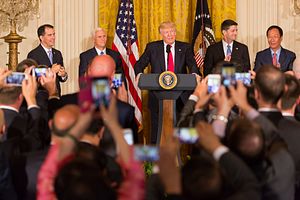On July 26, Terry Gou, the chairman of Foxconn — the Taiwanese electronics manufacturing company and supplier for Apple and other tech giants — met with U.S. President Donald Trump at the White House and announced his big plan for opening a new factory in Wisconsin. The next day, China replied that Foxconn’s investment in mainland China wouldn’t be affected.
According to the White House, Foxconn’s plan will bring $10 billion in investment and create thousands of new jobs in America. In addition, the investment “represents a major advancement in regaining America’s place in advanced electronics manufacturing.”
Trump was particularly proud of the “incredible investment” and claimed full credit for himself: “Chairman Gou put his faith and confidence in the future of the American economy. In other words, if I didn’t get elected, he definitely would not be spending $10 billion.”
On July 27, China also commented on Foxconn’s big plans, in a quite modest and positive tone.
When asked at a press conference whether China was worried about Foxconn’s investment in America, Ma Xiaoguang, mainland spokesman for the State Council Taiwan Affairs Office, replied that “Foxconn has continuously expanded its investment on the mainland this year and the existing companies have not been affected.”
In addition, he emphasized China’s welcoming attitude toward Taiwan-funded enterprises as a whole:
The Chinese mainland has shown clear and consistent gestures to support Taiwan-funded enterprises to thrive on the mainland… the future of Taiwan-funded enterprises on the mainland remains promising.
Despite what Ma said, the reality might not look so promising for mainland China given the current tension in the Taiwan Straits. Since Tsai Ing-wen became president of Taiwan, cross-strait relations have been deteriorating. Tsai’s administration also purposefully encourages Taiwanese companies to invest outside of mainland China.
In June 2017, Taiwan sent its biggest-ever delegation — composed of 140 representatives from 84 Taiwan businesses — to attend the SelectUSA Investment Summit in Washington, DC and aimed to invest $30 billion in America. Apple Daily quoted a Taiwanese professor as saying that Taiwan’s government planned to guide China-based Taiwan companies toward the U.S. market in order to show goodwill to the Trump administration as well as to decrease reliance on mainland China.
Charlotte Gao holds a MA degree in Asian Studies. Her research interests center around East Asian topics. She has worked in the past as a news editor, reporter, and writer for multiple traditional, online, and new media outlets.

































